  |
|
|
CHAPTER 11
The Strategy for Subjugating and Dominating Humans
How does the Money Trust
dominate the marketplace? Charles Darwin provided -- perhaps unwittingly -- not only the
scientific prescription, but the scientific justification for domination. In The
Origin of Species, Darwin argued "that individuals
having any advantage, however slight, over others, would have the best chance of surviving
. . ."1 [my emphasis].
Financial Darwinists chose
to interpret "Natural Selection or the Survival of the Fittest"2 to mean that their financial
fitness can be improved by acquiring "advantages, however slight," over others,
and that the subjugation of others was natural. It did not matter whether the advantages
were merited or not; after all, Darwin wrote "[m]an selects only for his own
good."3 Even more importantly, Ecclesiastes
revealed,-- and this was pointed out by Hayek --, "that the race is not to the
swift, nor the battle to the strong, neither yet bread to the wise, nor yet riches to men
of understanding, nor yet favour to men of skill . . ." [Ecclesiastes 9:11].
The strategy would
therefore be simple. All financial Darwinists have to do is:
MANIPULATE
THE RULE OF LAW TO GIVE THE MONEY TRUST NET ADVANTAGES, HOWEVER SLIGHT, OVER THE
CITIZEN -- AS BORROWER, AS WORKER, AS EMPLOYEE, AS TENANT, AS IMMIGRANT, ETC.,4 -- THEN BLAME UNJUST OR EVIL
OUTCOMES ON "TIME AND CHANCE."
To paraphrase Voltaire, if
Darwin didn't exist, the Money Trust would have had to invent him! -- not because he
provided new scientific knowledge, but because he provided authoritative scientific
legitimacy for what Darwinists have been doing long before any Darwinian theories
could be formulated.
The
Law of God?
Capitalists, like John D. Rockefeller and Andrew Carnegie, were thrilled with Darwinistic
theories of survival of the fittest. "The growth of a large business . . . is
not an evil tendency in business," Rockefeller held, but "merely a survival of
the fittest . . . merely the working-out of a law of nature and a law of God."5
It is interesting to
note that Rockefeller was a philanthropist. According to Zinn, he helped found the
University of Chicago.6 Coincidentally, the University of
Chicago has long been an intellectual bastion for Capitalism -- an academic base for a
distinguished group of economists, such as Milton Friedman, Friedrich Hayek . . .
Ant
"Slavery." Of
course, Capitalists have never needed fraudulent Darwinistic interpretations of the theory
of evolution to exploit or plunder in the marketplace. All they needed was to mimic the
behavior of ants. Servitude is alive and well in antdom. Some ant colonies constantly
fight neighboring ant colonies. The victorious ants enslave the defeated ants.7 Could have men learned the benefits
of slavery from ants?
More than 2300 years ago,
Aristotle explained how slavery and limited servitude -- were the condition sine qua non
for leisure and the good life for freemen. The "good life"
is reserved for the "natural master" who is fit to rule the "natural
slaves" of the "household."8
The
Dark Depths of Malthusian Doctrine. In a notorious essay, first
published in 1798, Rev. Malthus, contemplated the "great question" regarding
"the future fate of mankind":
". . . whether man
shall henceforth start forwards with accelerated velocity towards illimitable, and
hitherto unconceived improvement, or be condemned to a perpetual oscillation between
happiness and misery, and after every effort remain still at an immeasurable distance
from the wished-for goal"9 [my italics].
Malthus, apparently, did
not believe in the "perfectibility of the mass of mankind,"10 as advocated by the Marquis de
Condorcet and by William Godwin. He insisted that one must "read God as he is"
-- and not as we wished Him to be.11 For this, he argued, one must
(following the lead of the physicist Newton) read the book of nature. So, what did
the book of nature reveal to Rev. Malthus? It revealed the seeds of Darwinistic
doctrine:
- Mind is formed out of
matter. Beings rose from "specks of matter" and many evolved to "high
qualities and powers as seem to indicate their fitness for some superior
state"12 [my italics].
- If "virtue"
exists, then its opposite, "moral evil," must also exist.13
- Man's activities are driven
by "the wants of the body." These activities are excited and stimulated
by "evil." Malthus held that "[e]vil exists in the world not to create
despair but activity"14 [my emphasis].
- Vices are
"invincible." Therefore, man and society are essentially not perfectible. There
is essentially not much the rich can do to ameliorate the "condition of the lower
classes of mankind."15
- Hell
does not exist. As
"a merciful and righteous Being," God cannot condemn His own creatures, even the
evil among them, to "eternal suffering."16 In his Epistle to the Romans, St.
Paul wrote "the wages of sin is death" [Romans 6:23]. Therefore, Malthus
concluded, the wages of sin are not eternal torment in Hell.
Malthus' doctrine of natural
selection is a prostitution of reason -- packaged as God's law. Evil does excite
activity, but, notwithstanding Malthusian logic, it is a sure cause of much misery
and despair. One can easily apprehend how Malthusian logic can be used to prostitute
reason to the interests of rapacious Capitalists:
- Man should preferably be
virtuous -- but he does not need to be, he merely has to avoid evil.
- Exploitation enhances the
survival of the exploiter; it is therefore a mark of fitness and superiority.
- Despite their superiority,
there is not much the rich can do to help the "lower classes." Large
corporations, therefore, do not have to have a social responsibility.17 Their only responsibility is to maximize
profits for their stockholders. This defective, subversive maxim is promoted by the
brain trust of Capitalism.
- The "moral
excellence" of Man derives from the "evil" that excites him -- to
act qua Capitalist.
- Should his rapacious
exploitation condemn others to misery, the Capitalist can rest assured that he would not
be punished eternally in hell!
Perverted interpretations
of Malthusian doctrine provided some of the most deceptive justifications for plunder --
as stimuli for Dominion and Empire building. "Evil temptations" may well have excited
the "moral excellence" of Empire builders. But even Malthusians have to read
"evil" as it really is -- and not as they fancy it to be. A new
reading of the "book of nature" should not surprise Malthus: the sun has set on the Empire -- from Hong Kong to Palestine to
Ireland to Québec. It will no doubt set next on rapacious Capitalism. The wages of sin
are death. These wages also apply to evil empires -- political and corporate.
Was
Darwin Fit? The
capitalists' insistence upon fitness in the marketplace raises interesting questions:
- Was Darwin fit? According to
Peter Medawar, the Nobel Prize Winner for Medicine in 1960, Darwin was "a sick
man" for the last 40 years of his life.18 Furthermore, three of Darwin's ten
children died early; one was a retarded child.19
- What about Rev. Malthus?
According to Antony Flew, Malthus suffered a "cleft palate." Apparently, this
congenital condition "ran in the family."20
- What about Karl Marx? Marx
was no model of perfection: he and his "aristocratic" wife Jenny lost three of
their six children -- partly because of poverty.21
Why am I telling you this?
Because the fitness of Man as Man derives from intellect
and virtues -- and not from the biological fitness of Man as Animal.
|
|
| 1
See Charles Darwin, The Origin of Species (1859), in Darwin, 2nd ed.,
edited by Philip Appleman, 1970 and 1979, at 54 (advantage and survival). 2 Ibid., at 54
("Survival of the Fittest").
3 Ibid., at 56
("[m]an selects only for his own good").
4 See Howard Zinn, A
People's History of the United States, 1492-Present, 1980 and 1985, at 99 (biases in
contracts between rich and poor).
5 Quoted in W.J.
Ghent, Our Benevolent Feudalism (1902), at 29 (cited in Richard Hofstadter, The
Vogue of Spencer (1955), in Darwin, 2nd ed., edited by Philip Appleman, 1979 and
1990, at 397).
6 See Howard
Zinn, A People's History of the United States, 1492-Present, 1980 and 1995, at 256.
7 See Bert
Hölldobler and Edward Wilson, Journey to the Ants, 1994, at 126-131.
8 See Aristotle, Politics,
translated by Ernest Barker, revised with an Introduction and Notes by R.F. Stalley, at
xvi-xvii (the institution of slavery), 13-17 (1253b23-1254b39, on
slavery), 67-68 (especially 1269a29, on serfs and Helots), 97-99 (especially
1278b30, on the "natural master" and the "natural slave"),
and 330 (Explanatory Note 1260b on "limited servitude").
9 See Thomas Malthus,
An Essay on the Principle of Population (1798 and 1830), edited with an
Introduction by Antony Flew, 1970, at 67 ("the great question").
10 Ibid., at
72 and 124 (argument against the "perfectibility of man"), and 168-170 (Godwin's
argument for, and Malthus' argument against, perfectibility; Godwin's Political Justice).
11 Ibid., at
201-204 ("read God as he is").
12 Ibid., at
214 ("fitness for some superior state"). Malthus' influence on Darwin is
corroborated in Darwin's own Autobiography, see Note 47 at 284.
13 Ibid., at
210 (high probability that "moral evil is absolutely necessary for the production of
moral excellence").
14 Ibid., at
217 ("[e]vil exists in the world not to create despair but activity").
15 Ibid., at
170 (vices are invincible), and 172 (the rich cannot help the poor achieve economic
equality).
16 See Thomas
Malthus, An Essay on the Principle of Population, edited with an Introduction by
Antony Flew, 1970, at 215 (no eternal suffering), 215 ("the wages of sin are
death"), and 214-217; (rejection of the doctrine of Hell).
17 On social
responsibility, see Milton Friedman, Capitalism and Freedom, 1982, at 133-136
(Social Responsibility of Business and Labor).
18 See Peter B.
Medawar, The Strange Case of the Spotted Mice, 1996, at 52-58.
19 See Robert Wright,
The Moral Animal: The New Science of Evolutionary Psychology, 1994, at 176-177.
20 See Flew's
Introduction to Malthus' Principle of Population, 1970, at 8.
21 See Karl Marx, Capital
(Vol. 1, 1867; Vol. 2, 1885; and Vol. 3, 1894), edited with an Introduction by David
McLellan, 1995, at i and xxxi. |
|
| THE REAL
CAPITALIST ECONOMIC ORDER |
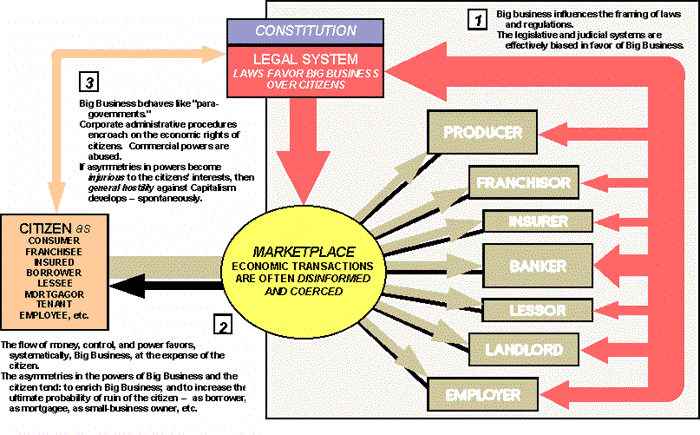 |
Plate
11-1 The Real
Capitalist Economic Order: How the Economic Successes of Capitalism Can Kill CapitalismAccording to
Schumpeter, the very successes of Capitalism will ultimately kill capitalism.
"Monopolistic practices"1 create huge concentrations of wealth -- and
power. Such successes, at the expense of the citizen, inevitably lead to general dissent
and hostility2 -- in some cases (e.g., Canada), to the potential breakup of the
country.
Sources:
1 Joseph A. Schumpeter, Capitalism, Socialism and Democracy (1942), 3rd
ed., 1942, 1947, 1950, and 1976, at 87-106 (Monopolistic Practices).
2 Ibid., at 131-142 (Crumbling Walls), and 143-163 (Growing Hostility).
[Copyright © 1998 by
MACROKNOW INC. All rights reserved.]
|
|
THE DARWINISTIC
MARKETPLACE
THE
"GAME OF CATALLAXY" -- THE TYRANNY OF GREED |
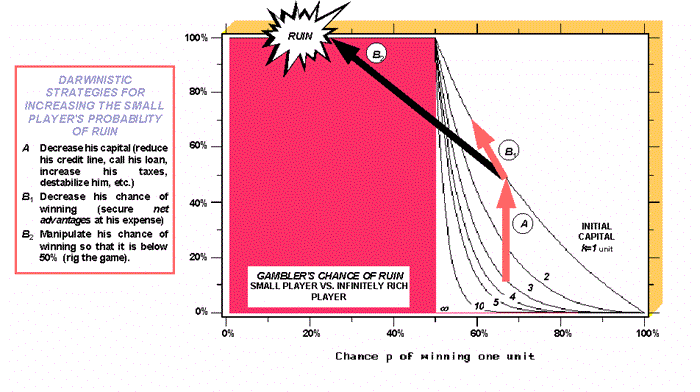 |
| THE
"GAME OF CATALLAXY" 1
The champions of Capitalism insist
that a free marketplace is the condition sine qua non for political freedom. People
must be able to exchange goods and services freely, without coercion.2 My
dispute with the champions has nothing to do with the indispensability or essentiality of
free exchange -- but everything to do with net advantages masquerading as virtuous
free exchange.
Hayek claimed that "freedom is
inseparable from rewards," and rewards "have no connection with merit."3
People who play the marketplace game -- the "game of catallaxy" -- according to
the "rules of just conduct" are not guaranteed a "just" outcome.4
This doctrine is consistent with Ecclesiastes 9:11: swiftness, strength, wisdom,
understanding, and skill, do not guarantee the outcome of the race; only "time
and chance" do.
This doctrine can be wickedly
distorted to legitimize fraudulent deviations from fairness and justice in the
marketplace. |
Plate 11-2 The Market
"Game of Catallaxy": The Small Player Versus the Infinitely Rich Player
Conceived
as a game, the Darwinistic marketplace functions essentially as follows:
- All transactions (employment,
mortgages, leases, purchases, insurances, pensions, etc.) are essentially gambles
-- with winners and losers.
- Rich players (big banks, big
landlords, transnationals, governments, etc.) have entrenched net advantages over
small players (individuals, workers, small business owners, etc.). The game follows
the Solomonic prescription in Ecclesiastes 9:11: swiftness, strength, wisdom,
understanding, and skill, do not guarantee the outcome of the race; the only
determinants are "time and chance." This means that the game can be rigged
in favor of the big player. The teleological justification for this is Proverbs 22:7:
"The rich ruleth over the poor, and the borrower is servant to the
lender."
- Propaganda instruments can be
used to deceive small players into believing that the marketplace is a free enterprise
system.
The
object of the game is not just to maximize profits, but to build a NEW WORLD ORDER
-- one in which a few big "winners" OWN AND CONTROL much of the capital in the
global marketplace.
Can the small player survive
in such a marketplace? Can advantaged big players ultimately reduce the small player to de
Tocquevillian servitude? The Plate illustrates how a hypothetical gambling game
can increase the small player's total chance of ruin.5 The game consists
of a series of sequential market transactions in which each player gambles one unit per
transaction. The small player has an initial capital k. His opponent is an
infinitely richer player (e.g., a monopolist). The small player's chance of winning one
unit from his rich opponent is p. The game stops when one of the players loses all
his capital (i.e., is ruined). The graph reveals three
Darwinistic strategies a rich player can use to ruin any small player:
- Decrease the small player's
access to capital and destabilize him (decrease k).
- Use monopoly powers to
control prices. Keep prices artificially high (increase 1/k).
- Secure net advantages
(merited or not) over the small player. Reduce the small player's chance of winning in the
marketplace, in the stock market, in the courts, etc. (decrease p).
IS
CANADA'S ECONOMY DARWINISTIC?
- Enormous financial and commercial
powers in Canada are concentrated in five or six banks. The asymmetries in the
powers and advantages of Big Banks over Small Business have been systematic and
overwhelming.
- Canada's business environment has been pernicious.
During the period from 1990 through 1995, Canada suffered 77,050 business bankruptcies --
and 340,571 consumer bankruptcies!6
- A significant proportion of Canada's
economy is foreign controlled. For example, in 1993, about 52.3% of Canada's top 300
private companies were foreign controlled (49.7% were 100%-foreign controlled).7
- Massive export powers are concentrated
in a few corporations. In 1990, for example, only five exporters (0.07% of all exporters)
controlled about 21.2% of total exports; the last 61,781 exporters (98.6%) controlled only
14%!8
- The empirical evidence from Canada's
courts corroborates substantial judicial biases. Peter McCormick provided the
following statistics (based on Reported Provincial Appeal Court Decisions, 1920-1990): the
net litigation advantage of Big Business (banks, insurance companies, and major
corporations) was +21.1%; by contrast, the net litigation advantage of Other Businesses
(including Small and Medium Enterprises) was -4.8%, and that of Individuals was -7.2%.9
|
Sources:
1 On the operation of the market -- as a "game of catallaxy" --, see
Friedrich A. Hayek, Law, Legislation and Liberty, Vol. 2, 1976, at 107-132 (The
Market Order or Catallaxy).
2 On transactions in the "free private enterprise exchange economy,"
see Milton Friedman, Capitalism and Freedom, with the assistance of Rose D.
Friedman, 1962 and 1982, at 7-21 (The Relation Between Economic Freedom and Political
Freedom).
3 See Friedrich A. Hayek, Law, Legislation and Liberty, Vol. 2, 1976, at
120.
4 Ibid., at 126.
5 On the gambler's ruin, see Norman T.J. Bailey, The Elements of
Stochastic Processes with Applications to the Natural Sciences, 1964, at 24-37 (Random
Walk Models).
6 Bankruptcy Branch, Consumer and Corporate Affairs Canada (Canadian consumer
and business bankruptcies).
7 On the top 1000 companies in Canada in 1993, see The Globe and Mail, Report
on Business Magazine, July 1994.
8 For Canadian export statistics, see Paul Toriel et al., Financing the New
Economy, Towards a Positive Conspiracy, Industry Canada, June 1994 (cited sources:
ESBO, Industry Canada, and Statistics Canada).
9 Peter McCormick, Canada's Courts, 1994, at 157 (Table 10.1: Success
Rates, By Litigant Category; Reported Canadian Provincial Appeal Court Decisions,
1920-1990), and 164 (Table 10.3: Reversal Rate as Appellant and Respondent By Type of
Litigant; Supreme Court Decisions 1949-1992).
[Copyright © 1998 by
MACROKNOW INC. All rights reserved.]
|
|
THE ROAD TO FREEDOM
PRACTICAL
STEPS FOR INCREASING YOUR SURVIVAL IN A DARWINISTIC ECONOMY |
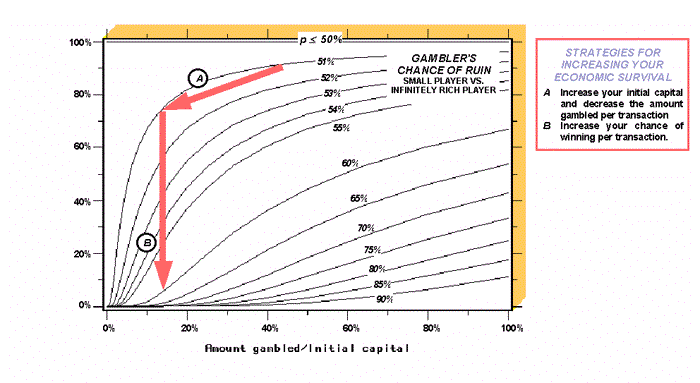 |
Plate
11-3 The Road to
Freedom: Practical Steps For Increasing Your Economic Survival in a Darwinistic EconomyWhat can you do to avoid servitude
in a Darwinistic economy? Increase your Darwinian fitness (see previous Plate):
- Increase your initial capital
(increase k). Be vigilant: avoid doing business with a lender who can arbitrarily
or capriciously reduce your capital (e.g., by suddenly freezing, reducing, or calling your
loan); avoid giving a lender a personal guarantee -- unless he gives you his equivalent
guarantee in writing; avoid vulture capital masquerading as venture capital. Adopt
Benjamin Franklin's motto: never sacrifice your liberty for
security.
- Lower the cost of every
transaction (decrease 1/k). Be informed: shop for the best price; do not depend on free
trade -- there is no free lunch.
- Augment your chance of
winning (increase p). Organize small players. Protect your own economic
interests: start a personal defense fund; develop a strategy with countermeasures
and counter-countermeasures; fight vigorously for your economic rights. Demand
that the legislature and the judiciary eliminate all unfair, unjust, and unmerited net
advantages. Fire politicians who do not comply.
[Copyright
© 1998 by MACROKNOW INC. All rights reserved.]
|
|
THE EVOLUTION
OF DARWINISTIC CAPITALISM
DARWINISTIC
UTILITARIANISM AND ITS INEVITABLE ORWELLIAN CONSEQUENCES |
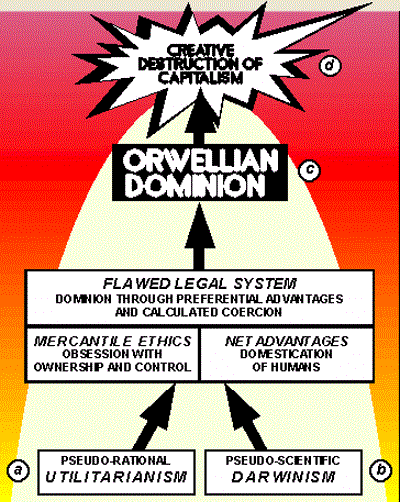 |
KEY
a UTILITARIANISMUtilitarianism is a pragmatic
mercantile calculus of rights and morality,1 based on the insights, conscience,
and wisdom of philosophers-accountants, purporting to MAXIMIZE HAPPINESS.2
The utility of rights and justice are
linked to the need for security of life, limb, and property.3
The quantity and quality of a person's
rights are derived from the person's need for security. Therefore, if a person has no property, then he has no rights.4
Historically, many utilitarians
believed that if slavery could promote the greatest happiness then slave labor would be exploited -- until
it became absolutely
wrong to do so.
b DARWINISTIC
DOCTRINEDarwinistic beliefs are based on a
defective interpretation of Darwin's empirical findings.
Darwin's theory posits that the
"[s]truggle for Life [is] most severe between individuals and varieties of the same
species";5 and that individuals having "any advantage, however
slight, over others"6 have a better chance of survival and procreation.
Capitalists interpreted the theory to
mean, that to survive and breed more money, you have to be Darwinistically fit -- that is,
you must give yourself advantages, however slight, merited or not, over others.
While Man is descended from some lower form, he is most dominant.7 Therefore, the subjugation of others is a NATURAL and acceptable part of
the social and economic order.
c ORWELLIAN
DOMINIONThe evolution of Darwinistic
capitalism, if unchecked, will culminate with a few global organizations controlling most
of the peoples' economic transactions.
Electronic and digital technology
(computers, telecommunications, global positioning satellites, databases, software, etc.)
is currently available to start the Orwellian8 process of dominion.
d CREATIVE
DESTRUCTIONInevitably, the process of economic
dominion would be perceived as a destructive colonization
of man himself.
General hostilities9 against Orwellian control would
result in the Creative
Destruction10 of brutal
social and economic dominion -- that is, in WORLD
WAR III.
Conditions for better and fitter
democracies would emerge. The People would force governments to match rights and
advantages with specific duties and responsibilities.
|
Plate
11-4 From
Darwinistic Utilitarianism to Orwellian Domination: A Model of the Evolution of
Darwinistic Capitalism
The
Model is derived from information in several sources:
1 John Stuart Mill, Utilitarianism (1861) in Utilitarianism and Other
Essays, edited with an Introduction by Alan Ryan, 1987, at 35 (Mill "thought that
he had been brought up to be a calculating machine").
2 Ibid., at 278 ("Utility, or the Greatest Happiness
Principle").
3 Ibid., at 53-55 ("need to be secure").
4 Ibid., at 57 ("Hume . . . declared that where there was no
property there was no injustice").
5 Charles Darwin, The Origin of Species (1859), in Darwin, edited
by Philip Appleman, 2nd ed., 1970 and 1979, at 48-50 (Struggle for Existence).
6 Ibid., at 54 ("Natural Selection, or the Survival of the
Fittest").
7 See Charles Darwin, The Descent of Man (1871), in Darwin,
edited by Philip Appleman, 2nd ed., 1970 and 1979, 161 ("[m]an . . . is the most
dominant animal").
8 George Orwell, Nineteen Eighty-Four (1949), 1987 and 1989.
9 Joseph A. Schumpeter, Capitalism, Socialism and Democracy (1942), with
an Introduction by Tom Bottomore, 3rd ed., 1942, 1947, 1950 and 1976, at 143-155 (Growing
Hostility)
10 Ibid., at 81-86 (The Process of Creative Destruction), and 59-163
(Part 2: Can Capitalism Survive?)
[Copyright © 1998 by
MACROKNOW INC. All rights reserved.]
|
|
EVOLUTION OF THE
MARKETPLACE
DARWINISTIC
"ADVANCEMENT OF THE WELFARE OF MANKIND"1 |
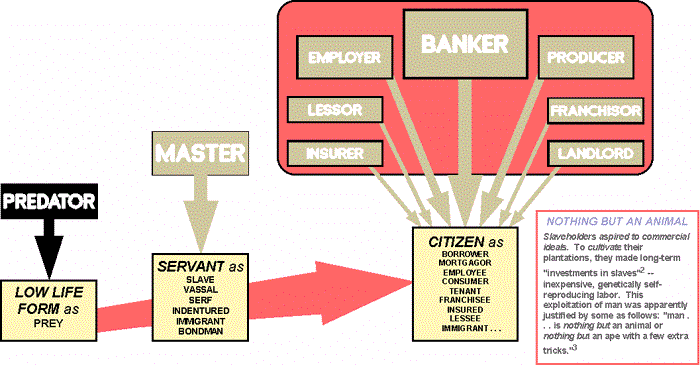 |
Plate
11-5 Evolution of the
Marketplace: Darwinistic "Advancement of the Welfare of Mankind"This Plate deciphers mankind's advancement
through the ages: Man, a lower life form, has advanced socio-biologically to the state of
citizen in liberal democracies, where the archaic hell of servitude masquerades as free
will.4
Sources:
1 Darwin's expression; see Charles Darwin, The Descent of Man (1871), in
Darwin, edited by Philip Appleman, 2nd ed., 1970 and 1979, at 207.
2 See Peter Kolchin, American Slavery 1619-1877, 1993, at 13
("self-perpetuating labor force"; "[a]n initial investment in slaves bought
a lifetime (and more) of labor").
3 See George Gaylord Simpson, The Meaning of Evolution, 1949 and 1967,
at 283.
4 For a discussion of "free will and servitude as coinciding in the same
existent," see Paul Ricoeur, The Symbolism of Evil, 1967, at 151-157
(Conclusion: Recapitulation of the Symbolism of Evil in the Concept of the Servile Will).
[Copyright © 1998 by
MACROKNOW INC. All rights reserved.]
|
|

|




